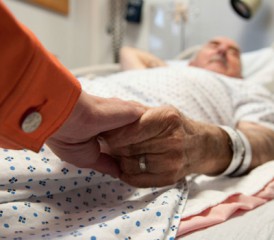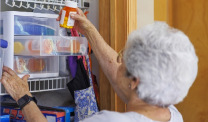A Loved One’s Chemotherapy Treatment Could Injure Their Caregiver
Cancer & CaregivingWritten by Lorraine Kember | Edited By Walter Pacheco

Prior to my husband Brian’s pleural mesothelioma diagnosis, the only thing I knew about chemotherapy was that it made people nauseous and caused hair loss. But the intricacies of how it worked to kill cancer cells were a mystery to me.
I was happy to keep it that way.
All this changed when Brian’s doctor recommended chemotherapy to relieve the symptoms of his disease. Suddenly, I wanted to know everything about this treatment and its potential effects on his body.
I searched the Web and learned that chemotherapy is a pretty nasty business. Its only saving grace is that it has been successful in eradicating curable cancers and relieving symptoms of those cancers which cannot be cured to improve quality of life.
A Quick Overview of Chemotherapy
Chemotherapy is the delivery of toxic drugs into the body with the sole purpose of killing rapidly dividing cancer cells. Unfortunately, it also destroys other cells that divide quickly, including those that comprise hair, nails and skin.
I was relieved to learn that healthy cells in the body recover more quickly than cancer cells and that some side effects, like nausea and vomiting, go away shortly after chemotherapy treatment comes to an end.
The specific drugs and how they are delivered will vary from patient to patient, depending on the type and stage of the cancer, the patient’s health and other factors.

Get mesothelioma books mailed to you overnight.
Get Your Books NowCan Chemo Affect a Caregiver?
Sitting next to Brian on the day he commenced treatment, I observed the nurses administering his chemotherapy drugs wearing purple rubber gloves and heavy aprons. The sight of that made me realize how toxic these drugs must be.
While Brian was undergoing his treatment, my only concerns were his well-being and the effects of the drugs on his body. After an interesting conversation with a nurse later that day, I learned that Brian’s treatment also could have a detrimental effect on my own body.
The conversation started after I observed hospital staff directing chemotherapy patients to a separate bathroom than everyone else. The door to that bathroom had a large purple sign that matched the color of the nurses’ gloves. It read: “Toxic – for the use of chemotherapy patients only.”
It made me think: Would Brian need a separate toilet at home after his chemotherapy treatments? So I asked the nurse. I’m glad I did, too.
She said chemotherapy drugs remain in a patient’s bodily fluids for up to 72 hours after therapy ends. This means the drugs are present in vomit, urine and excrement during that time.
- Skin rashes
- Upset stomach
- Headaches
- Allergic reactions
In extreme cases, it can even lead to cancer.
Precautions
The nurse warned me that caregivers of chemotherapy patients are at particular risk. She listed several precautions I should take to protect my health following each of Brian’s chemotherapy sessions:
- If there are two toilets in the home, the chemotherapy patient should use one, and the caregiver should use the other for at least 48 hours after treatment ceases. If there is only one toilet, male patients should sit when urinating to avoid splashing. When finished, they need to lower the lid and flush twice.
- If the patient vomits into the toilet, tell them to close the lid and flush twice. If the patient splashed vomit on or around the toilet, the caregiver should put on disposable rubber gloves, use paper towels to clean the spill, toss them in the toilet, close the lid and flush twice. Once the area is clean, remove the gloves, dispose of them and wash hands thoroughly with warm, soapy water.
- When it comes to sexual intimacy, avoid open-mouth kissing and use protection. Chemotherapy drugs are present in saliva, semen and vaginal secretions.
- Wash plates and cups solely used by the chemotherapy patient in a dishwasher, or use disposable plates and utensils. If there is no dishwasher, make sure the water is hot and soapy. Dry the dishes thoroughly.
- Do not wash any bedding or linens soiled with body fluids by hand. Place all soiled items in the washing machine, and wash them twice on the hot cycle. Be sure not to mix the linen with any other clothing. If they cannot be washed right away, keep them clear of other items by sealing them in a plastic bag.
Following these guidelines while your loved one undergoes treatment can help ensure that you stay safe while offering the best level of care possible.






